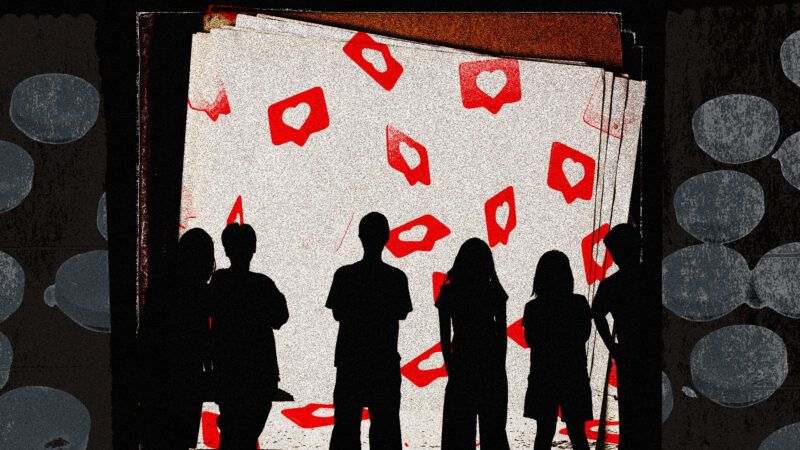Prosecutors Turn Their Extortion Racket Against Facebook and Instagram
The propensity of prosecutors to jump to conclusions before all the evidence is in is very destructive—and nothing new.

Having extorted what they could from pharmaceutical companies and pharmacies by blaming them for the overdose crisis, several state attorneys generals (AGs) have now set their sights on extorting social media platforms for causing so-called "social media addiction" among our youth. On October 24, 33 states filed a lawsuit in federal court alleging Meta "has harnessed powerful and unprecedented technologies to entice, engage, and ultimately ensnare youth and teens."
One of the allegations—that Meta violated federal law by collecting data on children under age 13 without parental consent—is prosecutorial fair game. Not fair game, however, is the claim that "the company knowingly designed and deployed harmful features on Instagram, Facebook, and its other social media platforms that purposefully addict children and teens," as New York Attorney General Letitia James, a co-plaintiff, made in an official statement about the case.
As I wrote in 2018, the science is still unsettled as to whether social media addiction is even a thing. Scientists and clinicians agree that the distinguishing characteristic of addiction is the compulsive use of a substance or engagement in a behavior despite negative consequences. Addiction researchers have not yet reached a consensus as to whether perceived excessive time spent on the internet and engaged with social media is an addictive behavioral disorder.
The American Psychiatric Association's Diagnostic and Statistical Manual of Mental Disorders (DSM-5) does not designate "internet addiction" or "social media addiction" as a mental disorder. Instead, it designates it as a "condition for further study," which is notable in light of economic incentives for the psychiatry profession to medicalize problem behaviors.
A 2009 analysis of 61 empirical articles on "internet addiction" conducted between 1996 and 2006 determined they used "inconsistent criteria to define internet addicts, applied recruiting methods that may cause serious sampling bias, and examined data using primarily exploratory rather than confirmatory data analysis techniques to investigate the degree of association rather than causal relationships among variables." A 2011 review by researchers at Nottingham Trent University also found empirical studies to have considerable limitations, restricting the "generalizability of findings." In a 2017 follow-up study, the researchers found that methodological problems persist. In a study published in 2017, Jean Twenge and colleagues at San Diego State University found that 99.64 percent of the girls' depressive symptoms did not correlate with social media use. While others have linked social media use with depression and even suicide, causation has not yet been established. Alas, this has not deterred politicians, pundits, and now, prosecutors, who are all too willing to jump to conclusions.
The propensity of prosecutors to jump to conclusions before all the evidence is in is very destructive—and nothing new. State and local prosecutors sought to blame the makers of prescription pain pills, pharmacies, and doctors for causing the overdose crisis, even though there is no correlation between prescription volume and nonmedical use or addiction to prescription pain pills. They embraced the narrative that overprescribing pain medications generated the current population seeking opioids in the black market and overdosing on fentanyl, despite government data showing the percentage of adults aged 18 and above addicted to prescription pain pills has been stable and never greater than 0.7 percent since the National Survey on Drug Use and Health began in 2002.
Prosecutors singled out Purdue Pharma, the makers of OxyContin, as the worst offender. The Food and Drug Administration approved OxyContin, a concentrated formulation of oxycodone designed to extend its pain-relieving effect, in 1996. A recent study published in the Yale Law and Policy Review found that "only 9.0% of all nonmedical opioid users in 2001 reported ever using OxyContin during their lifetime." The U.S. Supreme Court announced it will review a bankruptcy settlement between prosecutors and Purdue Pharma.
Meanwhile, as opioid prescribing plummets while pain patients suffer, the opioid overdose rate, mainly from illicit fentanyl, continues to climb.
A lack of scientific evidence didn't stop ambitious AGs from squeezing drug makers and pharmacies, allowing them to fill state coffers while harming patients and accelerating the overdose rate. That same ambition might also explain why prosecutors don't want to wait for conclusive evidence about social media addiction. Social media users should worry about what collateral damage to digital communication and innovation the prosecutors leave in their wake.


Show Comments (32)